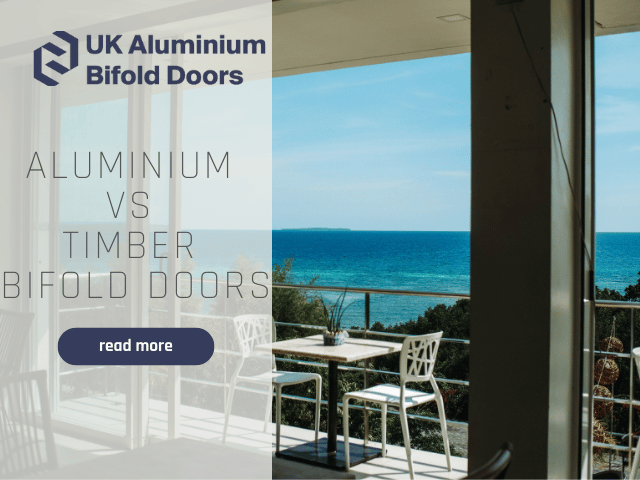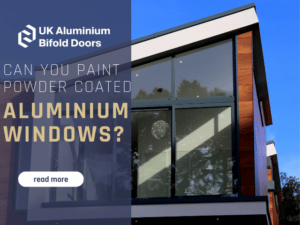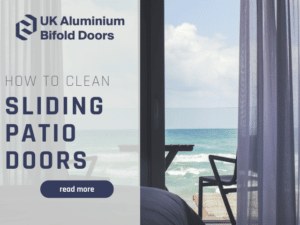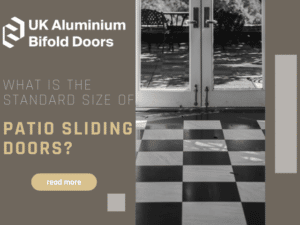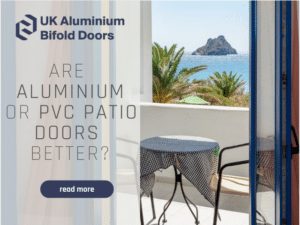Current ranges of aluminium bifold doors are taking the bifold door market by storm as a preferred choice among modern homeowners looking for an appealing option for taking their homes to the next level. Not only are they proving their worth from an aesthetically-pleasing perspective, but they also have notable durability, security and weather-resistant properties.
Other homeowners take a more traditional stance and believe that timber bifold doors offer as much from a more conventional perspective. Timber has proven over time, as the initial standard in door-producing material, that it still has much to offer.
Aluminium vs Timber Bifold Doors: Head-to-Head
Let’s take this opportunity to weigh the pros and cons of both types of bifold doors across a spectrum of six different categories, which will allow you, as a potential bifold door buyer, to decide which door is the right option for your home.
Durability & maintenance
Aluminium bifold doors are immensely durable and can withstand the most inclement weather. Aluminium bifolds can last over four decades if kept in decent condition. Over this long period, they would require some maintenance to keep them fully operational.
It’s essential to clean the tracks of these sliding doors intermittently and lubricate them when necessary. Apart from this, there is practically no maintenance required apart from possible hinge adjustments, but this may not even be necessary. Aluminium doesn’t rust, peel or discolour, so it requires little maintenance.
Aluminium bifold doors won’t expand or contract with fluctuations in heat, so it’s improbable you will have problems closing or opening your doors. Still, we can offer many tips on looking after your aluminium door should you need them.
Timber bifold doors also have long lifespans and can last upwards of 40 years. The difference is that they need constant maintenance over this period. Whilst a solid oak bifold door, for example, looks the part while adding warmth to your home, the wood is susceptible to weather elements and will require regular maintenance for protection.
Wooden doors no longer need yearly retreating to prevent water damage and harmful UV effects. Still, much does depend on the type of wood used and the quality of manufacture, which matters much more than with aluminium. Regular doses of sealant will maintain the door for longer, but without these, you can expect fading, warping, swelling and rotting.
Without regular sealing, water can infiltrate any surface cracks from the sun on wooden bifold doors, which will cause expansion of the cracks and swelling, which can ruin the wood. Many wooden bifold door owners treat their doors every few months, while others maintain them when the harsher seasons are nearly upon us.
Strength
The immense strength of aluminium means it’s certainly leading the strong door competition. You’ll notice that aluminium bifold doors like ours at UK Aluminium Bifold Doors include a range of doors with frames with slim sightlines allowing for more natural light and better views. This is only possible due to aluminium being incredibly strong.
The strong aluminium also enables manufacturers to build powder-coated doors with larger panels, which often comprise fewer panels, leading to sustained strength and durability.
Although many of the modern wooden bifold doors are more robust than in days of yore, due to manufacturers using engineered timbers that possess resilience and stability superior to standard wood, they’re still unable to compete with the fortitude maintained by aluminium bifold doors.
Insulation
Throughout history, the thermal performance of timber doors hasn’t been matched by any other type of door, but more recent technologies have levelled the playing field and seen aluminium bifold doors become arguably the best insulative bifold doors on the market.
There is a case to be argued that condensation on aluminium bifold doors is a problem. Still, every door manufacturer will tell you that condensation happens on every external door that has glass.
Wood’s natural properties mean it’s always going to be very good at keeping in warm air, but designers of aluminium bifolding doors have made great strides with double glazing to make their products more stable in both warmer and colder temperatures.
Sustainability & energy efficiency
Homes built with sustainable construction materials mean owners can maintain these for decades without compromising generations who follow. Aluminium doors fit this category well, as the strong material offers 100% recyclability.
As a natural material, timber is exceptional for sustainability, but aluminium won’t take up landfill space either, meaning both products will minimise your carbon footprint.
Also, aluminium doors and uPVC bifold doors are more energy efficient than timber due to wood’s expansion and contraction with fluctuating temperatures. The design of timber bifold doors includes leaving a small gap between the frame and the door to prevent over-expansion, where the door won’t operate appropriately until after it contracts again.
If you’re crazy about how a particular timber external bifold door looks, it makes sense to invest in a draught excluder to enhance your door’s efficiency and keep your living space warmer.
Aesthetic & curb appeal
All homeowners are different regarding how they want their homes to look and feel. If you own a more modern, contemporary property, you’ll likely invest in aluminium bifold doors ahead of timber bifolds. If you’re more traditional and favour the warm, homely appeal that timber doors bring, your choice of bifold door material will likely be wood.
Timber bifold doors and windows give your home a more natural feel and create a connection between your garden and your home. As such, they’re a popular choice for classic, period-style homes. The biggest problem is that timber will begin to fade after a few years, so you’ll need to maintain it well to keep up the homely appeal.
External doors are one of the first things that passers-by see. Once again, depending on your character and how you portray your home, timber vs aluminium bifold doors are aesthetically appealing, as are uPVC bifold doors to select observers.
The colour of your door also portrays your personality, and certain auras are associated with different colours. Aluminium bifold doors and windows come in various RAL colours, so you’re not limited in your choice. RAL is a widely accepted European colour management system.
Many manufacturers of external timber doors also offer them in various RAL colours. The benefit of wood is that you can repaint timber doors and windows. Manufacturers also offer different types of wood if you’re not a fan of oak. Elm, mahogany, beech and sycamore are all options, but some of these can make a very expensive material for a door.
Price
Aluminium bifold door costs are not cheap. Compared to standard timber bifold doors, prepare to spend a fair amount of money on your new investment if you choose aluminium doors. Perhaps some of the already-mentioned benefits of the metal door will make up for the price difference.
Bifold doors are also generally more expensive compared to other types of doors, including sliding and French doors. We have a guide on what French doors are if you would like to find out more about them and the price of them.
Maybe not, though. You’ve read through the above five categories, and ultimately it’s up to you to make the final choice. Aluminium bifold doors cost, on average, £3,800, including installation and depending on your choice of style, size and colour.
Wooden bifold doors are cheaper, and some of the categories we’ve already covered clearly indicate why. Does the lower price cover the difference in certain benefits, though? Timber bifold doors cost, on average, £3,400, depending on colour, style and size choice. The average timber price also includes installation.
Both average costs are quoted according to checkatrade.com figures.
FAQs
Are aluminium bifold doors cold to the touch?
Aluminium bifold doors don’t feel cold as they have polyamide thermal breaks between sections keeping cold out and warmth in.
Are aluminium doors worth the extra money?
Aluminium doors and windows are almost maintenance-free, durable, strong, bring in natural light and are resistant to corrosion. Unlike timber, there is no need for staining or painting to weatherproof them, and they won’t peel, flake or rot.
Will bifold doors add any value to my house?
Property experts and estate agents agree that installing bifold doors adds significant market value to your home.

